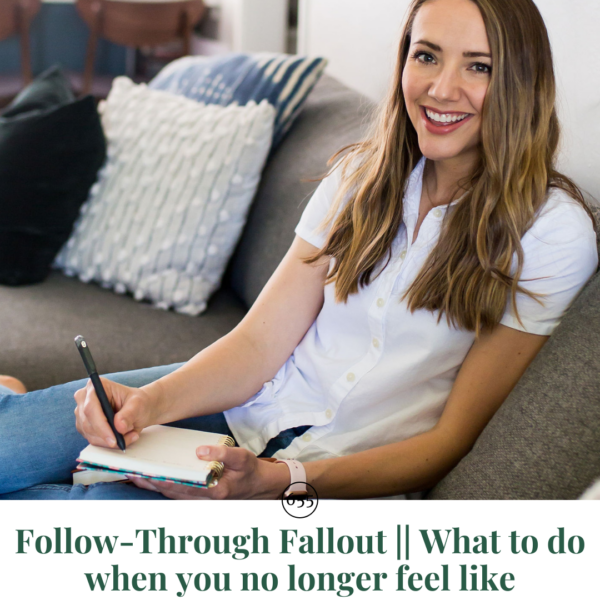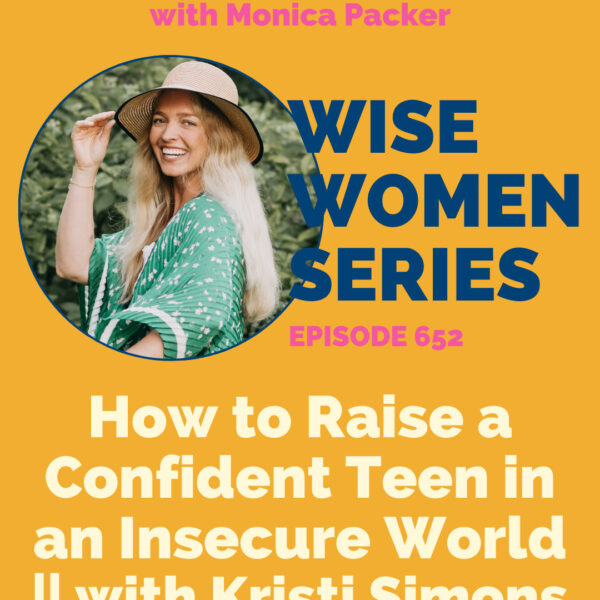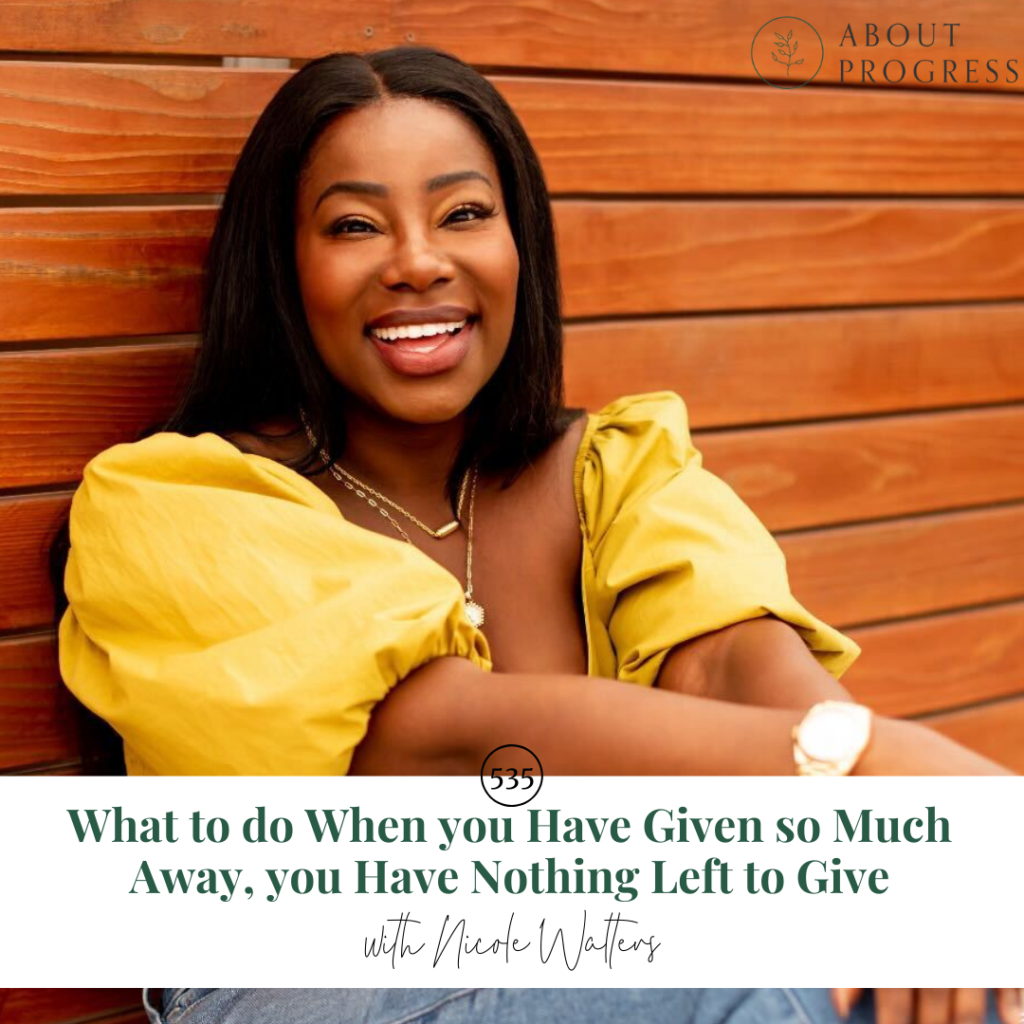
Nicole Walters, author, podcaster, daughter of immigrants, and self-made millionaire, opens up about her life, which includes adopting three girls, starting her own business, navigating a challenging marriage, and experiencing various personal struggles. She discusses how she fell into the pattern of being a “human giver,” always putting others first, and how it eventually led to burnout.
The conversation takes a deep dive into the concept of self-worth and the societal pressure on women to constantly seek external validation. Nicole shares her personal journey of realizing that true fulfillment comes from within and how her book, “Nothing is Missing,” encapsulates this empowering message. She encourages women to embrace the power of saying “yes” to help, acknowledging the immense weight they carry, and emphasizing the importance of self-care.
Host a Tricks and Treats gathering!
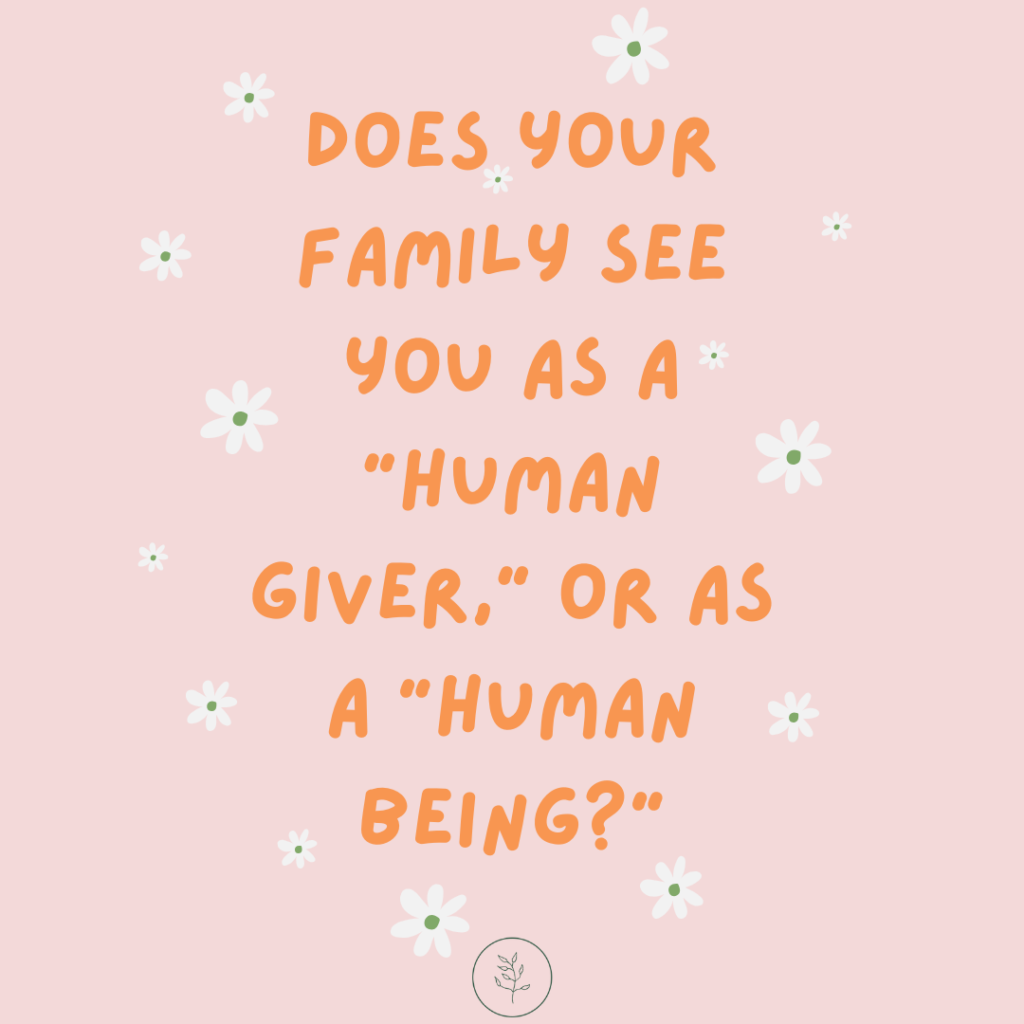
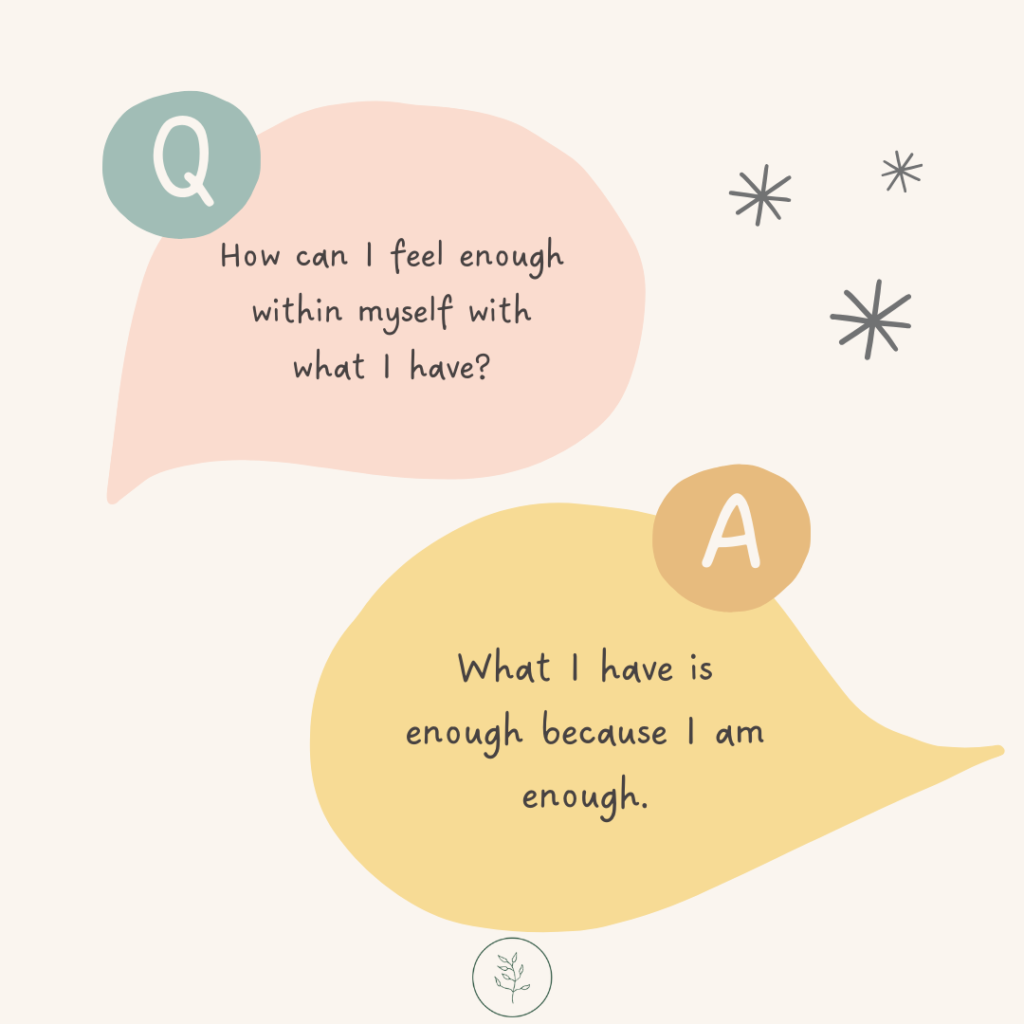
About a few other things…
Do you struggle to create habits that stick? It’s not your fault. The truth is simple: you’ve been trying to form habits using methods designed for perfect robots–not real women living real lives. It’s time to change that. If I could help you gain confidence in creating habits AND guide you to uncover the ONE supportive habit to deeply care for yourself, could you commit 21 days to learning this method? The Sticky Habit Method is a 21-day course that revolutionizes the habit-formation process. It’s real habits for real women.
Sign up for the Go Getter Newsletter to get Progress Pointers in your inbox every Tuesday.
This episode is brought to you by OneSkin. Get 15% off with the code PROGRESS.
You can listen the episode below, or on Apple Podcasts/iTunes, Spotify, Youtube, Overcast, Stitcher, Pocketcasts, or search for “About Progress” wherever you get your podcasts. If you like the show please share it, subscribe, and leave a review!!
SHOW NOTES
Nicole’s Website, Instagram
Try me FREE Class and check out my NEW Habit Course
Leave a rating and review for the podcast!
Lend your voice and experience + be featured on the show HERE
Join Monica on Facebook and Instagram
Songs Credit: Pleasant Pictures Music Club
TRANSCRIPT
Monica: Nicole Walters, welcome to About Progress.
Nicole: Oh my I’m so excited to be here
Monica: I cannot believe we get to have you on this podcast. I have been following you for years and I’ve learned so much from you.
You have this amazing light, but also you teach so much just by being yourself. And now we get to know even more about you that I think is so unique and special. But we’re going to talk about one specific thing that you have to share with us about, life and wanting to give and love other people.
But Crossing a boundary inside yourself too often, too much to a place where you lose yourself. And let’s start by just setting us up a little bit. The Nagoski sisters talk about this in their book, burnout, which is phenomenal about how we become human givers instead of beings. And I wanted to know just about your own story with being a human giver and how that affected you and how you knew it was time
to change.
Nicole: Oh, Monica, thank you so much for that. Yeah. It’s really interesting because I just finished writing my book. Nothing is missing. And, whenever it’s a memoir, but it’s what I like to call a fresh start memoir. It’s a tool. It’s a manual. And and it’s because I had to create a fresh start after spending.
So many years being a fierce giver, and we’re not just talking people pleasing. We’re talking, I adopted three girls from the streets of Baltimore city at ages three, 11 and 14, three sisters and, raise them all. Now they’re 11 21 and 24. It feels crazy to say that, in that season, I also started my own business, struggled and had a challenging marriage and, was trying to juggle it all. And what happened was I just kept giving. I thought that was the answer to every situation that came, and what I found was A lot of that giving and a lot of that thought process around if there’s a problem to give of myself as the solution really came from society, my childhood, and what is really glamorized as being an ideal mother and woman.
I really picked up those pieces and said, wow, these are the lessons and here’s how I got out of it for a fresh start.
Monica: Did you get to a point where you just hit that wall or was it more of just this gradual? I don’t know if it’s a dissolution of realizing I can’t uphold this position of being a giver constantly.
What
did that look like for you?
Nicole: So it’s twofold, right? I think a lot of moms can relate to this. You give in micro doses every day, whether it is just the attention span and the mental load of giving, when you have to unpack and give direction and tell all the. things. It’s just this habitual giving that we don’t even realize that we’re doing all along the way.
And it eats at you. You feel yourself feeling a little more tired, a little more frustrated and a little more overwhelmed. But it doesn’t seem that unusual because you acclimate to it. You don’t even know any different. There was that element that was always simmering, but it does build up to a, pressure cooker explosion, and that is absolutely what happened.
We were having some challenges with our eldest daughter. , we got her later than the rest, she was 14, she was older, she’d experienced more and seen more. She’d come in from a home with addiction and instability and food insecurity. And she was thriving, but when it came time for her to make another transition into college, that was where she was, really saying, look, maybe I don’t need anyone if I’m just going to be back out in the street again, and maybe no one really cares about me, and maybe I’m just not ready.
She was dealing with all these, and I think any mama who has teenagers can understand, very normal teenager y feels, but it was amplified by the trauma of her background. And, my answer to that was, Oh I’ll just give even more. But
it was my first time realizing that wasn’t enough. This was a journey. She would have to walk on her own. And it was one of my first times in my whole life where I realized that giving wasn’t. the answer. And if giving wasn’t the answer, how could I find a different way to show up as a mom where I was supporting without giving of myself because I still needed to be here just in case she fell, just in case it didn’t work out, , it was my first time letting go instead of giving and it transformed my approach to everything and changed my whole life.
Monica: In a nutshell, that’s why you’re here today, because I know there are so many women listening who can relate so specifically to what you said and others who just can relate to the general idea of those micro doses of giving over and over in a way that you just, you don’t even feel like I’m not being asked of much and yet I’ve given everything away.
And, but this is what’s been modeled to me. These are the expectations of my family, my society, my religion, and I. I don’t really know how to bear the weight of other’s expectations and my own expectations of wanting to show love, but how do I give from a different place? Let’s talk about that expectation piece.
You dealt with some pretty unique expectations on you from a young age. Tell us more about
Nicole: those. I was a child of two African immigrants who came here, wanting the most for my life, but that was by their definition, so I think we all can relate to wanting our kids to do just a little bit better than we did, but, we also have to adapt that to what suits them and so for my parents, it was, we want you to go to college and we want you to, be a lawyer, have a desk job because
I’m a taxi driver and I’m a secretary and we see this struggle and we want a different life for you, but the reality is I’ve always been very outgoing and I’ve always been someone who is really into helping people and, I’m very philanthropic and I’m, I’m a God girl.
And so what I always like to say is, your provision relies on your purpose, right? If I align with the purpose that God has designed for me, I will make money doing that. I will be able to find provision in that, but I have to trust that. And my parents had their fears that they would lend to me.
Around if I don’t give in a very specific way, and I carried those fears with me and they dictated so much of my life, including when they showed up at my 18 year old kind of dealing with this pivot point in her life, I was so fearful for her to go out on her own, thinking she wasn’t ready when I had to really accept.
that, as part of parenting, I’d given her everything that I could give her and she would tap into it when she was ready. And if that was the case, that nothing was missing with her, then the truth is nothing was missing with me either. And I had what I needed to solve things without giving too much or being fearful of not taking on what didn’t belong to me.
You’re so right. I think that human giver part of us it’s based in wanting to meet those expectations, but it’s also the fear of what will happen if we don’t meet them. But like you said earlier, you just give and give, but nothing will ever be enough. If that’s the paradigm you’re in and you have to shift to one of support, what did that look like for you?
What is the difference then? Because I’m sure if I were listening to this even five years ago, I’d be like, but then. My family will fall apart
easier said than done. I think we all have such a some people are probably listening girl, are you kidding me? The only support I get is from my Spanx, truly, it sounds crazy to even think, if I let things go, my, my kids genuinely need me.
And I think that what I. Really had to learn both through therapy and, prayer and reading and support. And frankly, just listening to people like you, Monica, and asking friends, what has worked for you was that. It’s not letting go all at once in the biggest areas, it’s picking places to empower people to support themselves.
For us it’s letting go, but for them it’s teaching. Some of the simple things, when my daughter was old enough that she had clarity around colors, we started sorting laundry together. When she got old enough to reach the top of the laundry machine, we were playing laundry basketball where she had to slam dunk into the machine.
Really recognizing that. In teaching and empowering my kids with skills related to independence, it was allowing me to shift things to them, but also empower them to learn what to carry and know that they’re learning all these things while I’m still here with them. So I can pick up, I can jump in, I can help support.
But the letting go part of it really allowed me to feel freer, to have more space. And honestly, There’s this and it’s hard to say on as I try not to get emotional about it But I know I won’t be around forever and that’s not a reality that my kids Know and I don’t even want them to have to think about but it’s a truth that I have to keep in mind if I’m Not gonna be around forever.
If tomorrow is my last day Do I want to make sure that they’re able empowered and capable to take what I’ve given them to go and run, And then thrive or do I want to be the person that they’re? Always relying on just to function, and I don’t want to do that to my kids and I didn’t want to do that in my life, so I take a lot of pride in teaching people to stand on their own and that in turn saved me from burnout.
Monica: I feel like there’s a difference in strength when you are shifting to this role of being a supporter rather than a giver, because it’s a strength for the other people, they learn how to get stronger, but it’s also an inner strength for you. And I feel that contrast is pretty big with.
The human giver, it’s just like a really, there’s a big lack of self worth there too. So can you speak more to that piece? Yeah. Because when you’re giving, you’re trying to get that reflection back to you, right? You are worthy. You are good. And then it’s never enough to give. You also don’t get enough back.
Nicole: Absolutely. Let’s just take a real moment and talk about how the world is set up to constantly tell women that we’re lacking. If you’re too skinny, are you sick? If you’re too thick, are you unhealthy? If you are, too pale, you need a tan. If you’re too dark, you need to get. Your complexion evened out, there’s always better and it always resides somewhere else and not with you.
And a lot of my life was based around seeking validation through the things that I was accomplishing. So if I was a great mom and my kids were thriving, oh man, I must be good. If I was a great wife who still. Uplifted my husband, even though I was having marital difficulties, even though I was struggling with communication, even though I needed more help, and, plot twist, spoiler alert, tiny spoiler alert for your fathers, I ended up getting divorced, and I’m after a 12 year marriage and, Talk about unexpected.
I didn’t see that coming, but it was because I had done everything, including my marriage, including picking all these pieces based on what I thought was right and expected of me, and ultimately would give me worth and value. I hit all these marks. I had the house, the car, the kids the marriage, and I did it.
But once you get everything and you realize, and you’re looking at your life and you’re saying, I still don’t feel enough. Then you really have to turn in and say, what on earth do I think is missing? That I am still seeking, is it just the validation? And that’s why my book is called nothing is missing.
When I had everything in hand and I realized that I still didn’t feel good enough, but there was nothing else left to do and no one else left to make happy. No one else left to give to. I’d given everything. I was getting sick. I was ill. , I realized, how can I feel enough within myself with what I have?
And that, I went off into a season of, that post divorce discovery, and and it was transformative. I’m happier than I’ve ever been. And I honestly have less than I ever did, before, but I have, when I say I have less, I truly have. More than I could imagine.
I’m so grateful. What I have is enough because I am enough.
Monica: How did you get to that enough place about yourself then? And I know that’s asking like
Nicole: It’s a loaded
Monica: question, right? I know. It’s pretty hard, but just tell us a little bit more about that.
Nicole: Yeah, so part of it is just being super transparent.
My body shut down, we are a finite Being , as a mom I would give my life for my children. Realistically, if you don’t take care of yourself and you deprioritize your well being, you will, truly give the last of yourself for your children.
I joke about it with mamas all the time. What was the last time you bought yourself a new bra? What was the last time? Just like little things that we don’t even think about, You deserve to have, a new bra that where the wire’s not poking you, as you’re in carpool line, and this is hitting home, it seems like such a tiny silly thing, but we will go out and prioritize our back to school shopping for our kids and wear a bra that’s two, three years old, and.
And that same thing happens with making our kids dentist appointments or not making our own, making our kids regular annual exams, but not making our own. If something happens to us and this is what happened, I hit that pivot point where I had prioritized so much of my kids. My middle daughter went through stage four cancer.
She’s fine now, but that took. all of me, to be present for that. My 18 year old went rogue in the world, and that took all of me. My marriage was a constant drumbeat of, of challenges that took a lot of me. And finally, my blood pressure was 173 over 153. I was experiencing facial paralysis, on one side of my face and, And I was just sad.
I could not get out of bed. And I couldn’t put my finger on it because I looked around and everything was quote unquote okay. The kids were finally healthy and recovering. Like, why was I still sad? And that was when I realized I had to get my body together before I could do anything else.
I physically could not. Meet my life. I couldn’t even give I had nothing left and I that discovery process started with staying still taking time and saying look I can’t get up anymore. So what does it look like if this is my new reality where I wasn’t able to give anymore? Where do I show up? And it was like you have to show up for self To get yourself healthy again, see the doctors, make the appointments, prioritize yourself so you can at least get back into fighting form.
And then once I did, I was like, I’m never going back. I’m never going back to this again.
Monica: That body brain spirit connection is so So true. And so understated too, because we often think we just have to work. It’s like that chicken and the egg question. Like I have to find myself and love myself, but in order to do that, you have to care for yourself.
And sometimes that’s what needs to come first. So you can earn that second part. Thank you for sharing so much about what you went through. Let’s turn to some tips for the women who are ready. To go there, to, to work on this to give better from a place of strength. And, this is where we would love to hear, where should they start?
What would you recommend they do?
Nicole: Sure. So I always like to give tiny things because I acknowledge that again, as we carry so much, it can sound. I don’t know how it is. I’m just such a grace girl. I’m a hot mess, for me, there’s joy in being able to grab a piece of snack cheese.
I also call it comfort cheese, depending on my mood, and sit in my Target parking lot or sit in my driveway for a minute and listen to a podcast. I I get that these little moments are sometimes all we get. But when I talk about transformative things, make a doctor’s appointment. Yeah, I know that sounds completely wonky, but it’s like truly make a doctor’s appointment, just go in and not an emergency appointment, not to solve the problem, go in and just get your numbers.
Even if you feel great, let it be a baseline then for what great feels like. So you have that measurement, and it was 1 of the 1st things I did to start off my, health process, and I did this without goals and without pressure. I wasn’t trying to lose weight. I wasn’t trying to get better skin.
I literally was like, look, what’s going on inside me so that I can at least know. And I found out a lot of things that I had to work on. And, sometimes we get scared of having more things added to our plate, but. If things in advance, you actually can do something about them and time is something we can’t get back.
So that’s always like a starting point, for a physical thing we can do, but then as a mental thing we can do, I always say challenge yourself to pick one no a day. And what is that one no a day? It might be something that you really thought, I could do this, but I’m gonna say no and I’m gonna choose Me when you start learning to prioritize yourself and just make a habit of it.
And when I say saying that, no, no, in a way where it’s like the answer is, I just don’t want to not that I can’t not that I don’t have the money for it. Not that this is annoying or impossible. No, I am actually choosing. If this is not something I want to do. I’m not going to do it.
And that includes your kids. If it’s like mommy come play. You know what, honey, actually mommy’s not going to play, but what’s great is you can do this activity instead and it’s going to be so much fun for you and mommy can play with you later or tomorrow you can do that like you are capable of doing that.
And when you start training your brain to realize that you are important, you are worth it, you are a priority and your no has weight and you don’t have to explain yourself, it’s. Transformative, not just to you, but to others recognizing and respecting your boundaries and and when you get that pushback because it will sometimes happen, people will be shocked.
When I started saying no, my family looked at me like, is she? All right, is she? Okay. Mommy is what do you mean? When the family started seeing that, it was surprising because they were like what do we do? But it’s in that sort of shift where they start realizing, okay, if mom’s not available, we have to do something else, you learn that they are just fine, and they learn that they can do it without you.
And it leads to freedom in ways that you never would have believed. But just, it’s just one tiny no. Nothing big, just one tiny. Yeah.
Monica: Here we talk a lot about small wins and doing something instead of all or nothing. And I love that way of starting and it comes back to reprioritizing, just like you said, like that is a huge shift right there is just the small ways you can work to reprioritize yourself.
Now, Nicole, want you to speak to the caregivers who are in the thick of it and they don’t really have a choice. Like you had a child with significant physical health problems. You had another child with other really significant problems that you couldn’t just say, figure it out, you have to be in that season.
And. For those who are in that season, no matter what it looks like, whether it’s a newborn or a teenager with huge mental health issues or a child with cancer, like you had or special needs, can you just say even one thing you would love for them to know one thing you can hope that will help you just get through this season?
Maybe they can’t totally reprioritize themselves in the way that they need to right now. What would you say?
Nicole: So the first thing I would say is, boy, do I see them. When I tell you that being in those seasons, you can feel so alone and it feels like there’s a lack of acknowledgement around how heavy of a lift you have.
And boy, do I see those mamas, even the single mom, I will never forget thinking to myself, what do single moms do when your kid is sick and you have to go pick up meds. Oh, you have to pack up a , sick kid, carry them into the store, pick up the meds and bring them home. That alone, so I see those women, and I send all the energy to them, but the thing, the answer I have for them is, different from the, no, it’s actually the, yes, it’s say yes to you.
All the help. Challenge yourself to say yes to all the help. And, and I know that can sound crazy, but when I tell you, you can actually build a force field of energy around you where people don’t even offer help anymore because, oh, she’s got it. It’s hard for her, but she’s got it. Start saying yes to all the help.
And the yes to the help, meaning if someone says, Oh, I can get the door for you at the store. Yes. Oh, do you need some help carrying this to the car? Yes. Do you want me to, stay with your kid for a few minutes after work? Even if it’s just a teacher. Oh, I can sit with him for a minute while you go do that.
Yes. I think we get so inclined because we understand, believe and have accepted the responsibility of caregiving that we are so quick to say we got it because we understand that it is the For lack of better phrasing, our responsibility to carry, and I hate to use the word burden because it’s not that we do choose it because it’s a love action, we love to be able to be there in that way because it’s a privilege to love our babies.
We see them in a way that no one else will, but saying yes, as much as possible to the help, you’d be surprised how much help is there and you deserve. That one minute that one less thing to carry that one, hand that one hand up, you deserve it. And and I know that for me.
I was humbled when I wasn’t well and I was humbled in some of these seasons to realize that, oh, I’m not enough and it’s not because I lack. I’m just not enough because truly this situation is so big. I need help to carry it. Nothing like sitting there dealing with. Chemotherapy and a cancer diagnosis to realize I am out of sorts.
There’s nothing I can do here. It’s not even, if I could give my left arm, I would, and I can’t. So I have to say yes to whatever is offered because that is the best way to get help. And so say all those yeses because you are deeply deserving and it is what is required for you to show up entirely. Thank you.
I can
Monica: feel the experience that comes from. It doesn’t feel like another just trope way of trying to just pat them on the head. That’s real. So thank you, Nicole. I’m going to make sure we link in the show notes to your podcast but I do want to talk about your book. So tell us about nothing is missing.
Looking at your beautiful behind you. Yes. I’m
Nicole: so excited about it. I’ve been writing this book for four years now, and I will be totally transparent. I’m Only sharing this with some people, but my book initially was going to be a, business book. It was how did I build a business in the midst of all the chaos?
But my goodness is the world need another 1 of those. There’s so many of those online right now. And the truth is. About two and a half years into writing the book, I started going through my divorce and I could not write, and and then after I started feeling better physically, I, that was all I could do was write, so I was unpacking how did I get here, from my childhood, from what choices have I made around relationships and how has that impacted my parenting and my decision making and what went right and what went wrong and, I, my life has come to a grinding halt, and I now have a choice of how, what I want to rebuild moving forward.
What am I keeping and what am I leaving behind? And in doing that, I put it all into this book. What’s interesting is I came from that standpoint of, okay, if I’m giving myself a fresh start, what am I leaving? What do I need to get? And life is filled with us constantly being told we need something else for our kids, even if we think we’re doing it right.
It’s Oh but you’re feeding your kid off of plastic. Gotta fix that. If you’re like, you use a microwave, that’s wrong. You let your kid breathe traditional oxygen. Terrible. I just feel like you can’t get it right. And if you think you’re getting it right, it all changes, and so I said if I’m giving myself a fresh start. If I am saying, what does a fresh start manual look like as a new mom, as a new business owner, as a toddler mom, as sending your kids to college, as what does it look like? Because I’m divorced now and this is a fresh start I didn’t expect. So what does it look like?
And I realized that the place to start is not seeking something else. It’s from acknowledging that nothing is missing with you. If all you have is what you have today how are you going to use that to the max, how are you going to use your mindset? If that is the thing you’ve got to push you forward, that you can believe and work hard for your babies and you will not lack, how will you use that in every way, in every place possible to get ahead?
If it’s just your resources, your friends, how are you going to use that to the max? And that’s what my book is through storytelling, through a real glimpse at how I survived, stage four cancer and a divorce and trauma for my youth and adopting these three babies, from the side of the street.
But each one required a fresh start for me and for my children. And that’s what this book is about, knowing that you may not have what you think you have. And in this world, I think increasingly we feel like even what we have doesn’t go as far, how do we use it to the max to get the life that we want without really sacrificing.
And Nothing is Missing is all about that.
Monica: I cannot wait to get my hands on it. I’m sure your voice is just so clear and that’s such a rare thing, to have someone who has such a clear voice. That’s hard earned though. Definitely by your experience. It’s been a privilege to have you here, Nicole. I wish you the best success with your book and everything that you are working
Nicole: on.
Thank you. Oh, Monica. Thank you so much for having me. That was awesome.
